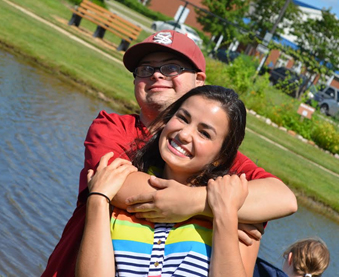
Chandler’s friend, Jason Dohrman, is a senior at Sparkman High School in Harvest, Alabama.
Every life is a gift. Each of us is fearfully and wonderfully made. If our society advocates for equality and opportunity for all, we must ensure the right to life, especially for those who cannot speak up for themselves. Nearly 90 percent of babies in the womb diagnosed with a disability like Down syndrome are aborted. This statistic is absolutely unfathomable.
The claim of atheist apologist Richard Dawkins that “it is immoral not to abort a baby with Down syndrome,” breaks my heart in more ways than one. My heart is broken because the very individuals who take this horrific stance are likely to have missed out on the opportunity to form the beautiful relationships that I have developed which have positively affected me. Some of my most cherished friendships are those that I share with my Down syndrome friends, who are extra-special to me.
With this in mind, Congress MUST pass H.R. 36, the Pain-Capable Unborn Child Protection Act, into law. The passage of this 20-week abortion ban would prevent the termination of an innocent child’s life past 20 weeks for any non-fatal reason — including those with diagnosed disabilities. The Pain-Capable Unborn Child Protection Act is important to all lives, but today I’m advocating for the passage of this legislation for our special needs community.
Let me share a personal anecdote:
Before my birth, my soon-to-be mother took a number of standard prenatal tests, and one indicated she was at high risk for having a child born with Down syndrome. My mother was encouraged by her nurse to undergo the prenatal testing procedure known as “amniocentesis.” According to my mother, our family medical records were not, and have not been, as readily available due to my family’s origin, which is one of the reasons they proceeded with the testing. As my parents were sitting in the waiting room, many of the couples surrounding them had a history of Down syndrome in their families. During the procedure, with the assistance of an ultrasound, a needle punctured my mother’s abdominal wall into her uterus to retrieve amniotic fluid for testing. This fluid contained fetal cells that were examined for chromosome testing to determine whether or not I, her baby, had Down syndrome.
By no means were my young and expecting parents considering an abortion, but they were desperately seeking answers to a question that they assumed a test would correctly answer.
The test led the doctors to believe I would be born with an extra chromosome. I would have Down syndrome.
The test was inaccurate. The test was also later labeled by my mother’s doctor, not her nurse who originally suggested the test, as an invalid and unreliable test.
Based on this personal anecdote, my concern is heightened for mothers like mine who achingly receive these (potentially inaccurate) results and, unlike my mother, regretfully choose to end their child’s life. The majority of abortions done to children diagnosed with disabilities occur after the 20-week period, and since the most informative testing procedures take place between 18-20 weeks gestation, there may be a correlation between the two.
This must stop. Congress must pass the Pain-Capable Unborn Child Protection Act.
I believe every child is a child of the Lord and deserves the right to life to fulfill a meaningful purpose. My heart beats wildly for the special needs community, and it manifests outwardly in the relationships that I have with my extra-special friends. Two of my friends have truly epitomized what it means to exude a genuine joy. Jason and Chad are brothers; they both have special needs, and their parents willingly adopted them. I am confident there are families who are actively seeking the opportunity to serve as loving parents to those with special needs.
Statistically speaking, 79 percent of parents said their lives were more positive as a result of their child with Down syndrome. Ninety-nine percent of people with Down syndrome reported they were happy with their lives.
Let us value opportunities for others. Let us value friendships, sons, and daughters.
Let us value life itself.
“I praise you because I am fearfully and wonderfully made; your works are wonderful, I know that full well,” Psalm 139:14.

